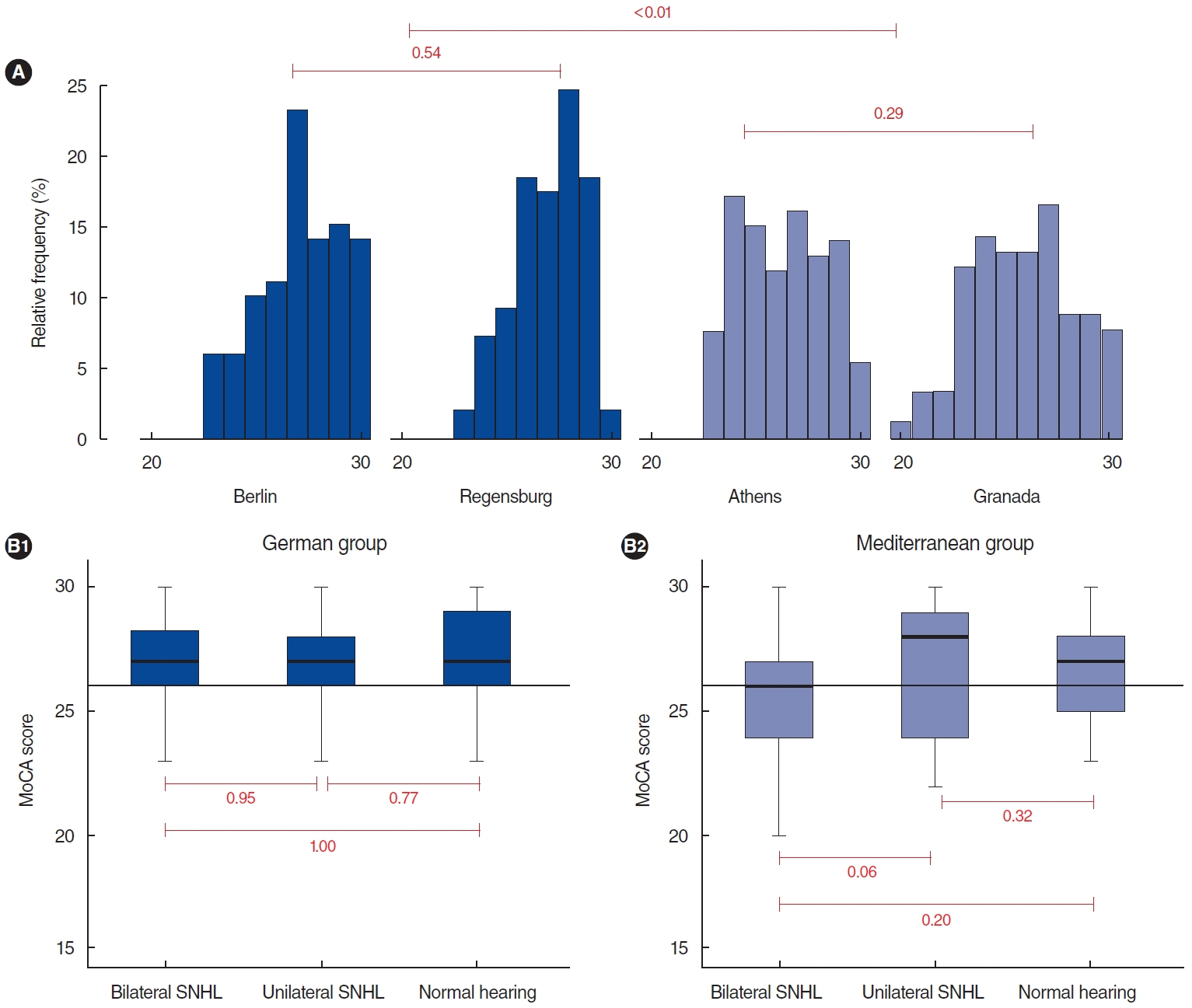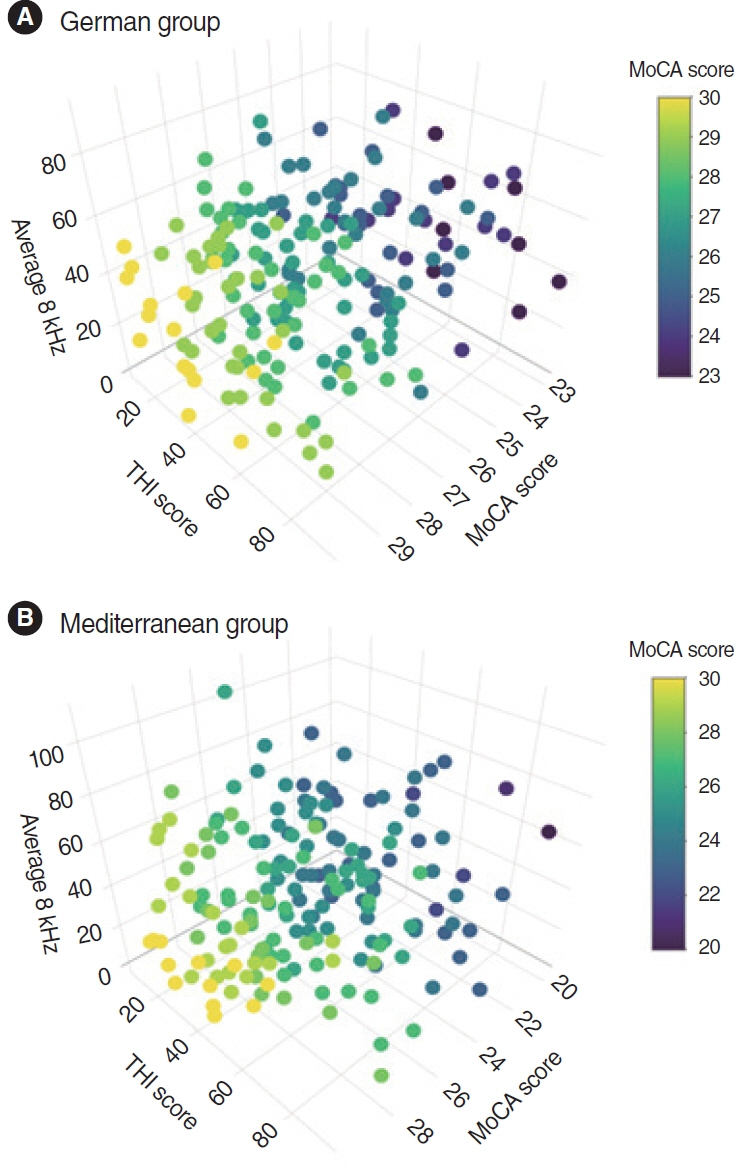Clin Exp Otorhinolaryngol.
2024 Feb;17(1):15-25. 10.21053/ceo.2023.00808.
Cognitive Screening and Hearing Assessment in Patients With Chronic Tinnitus
- Affiliations
-
- 1Otology and Neurotology Group CTS495, Instituto de Investigación Biosanitaria, ibs. Granada, Universidad de Granada, Granada, Spain
- 2Division of Otolaryngology, Department of Surgery, University of Granada, Granada, Spain
- 3Sensorineural Pathology Programme, Centro de Investigación Biomédica en Red en Enfermedades Raras, CIBERER, Madrid, Spain
- 4Department of Otolaryngology, Hospital Universitario Virgen de las Nieves, Granada, Spain
- 5Department of Otolaryngology-Head and Neck Surgery, Hippocrateion General Hospital, National and Kapodistrian University of Athens, Athens, Greece
- 6Charité‒Universitätsmedizin Berlin, Tinnitus Center, Berlin, Germany
- 7Department of Psychiatry and Psychotherapy, University of Regensburg, Regensburg, Germany
- 8Department of Human Sciences, Institute of Psychology, Universität der Bundeswehr München, Neubiberg, Germany
- 9Institute for Information and Process Management, Eastern Switzerland University of Applied Sciences, St. Gallen, Switzerland
- 10Meniere’s Disease Neuroscience Research Program, Faculty of Medicine and Health, School of Medical Sciences, The Kolling Institute, University of Sydney, Sydney, Australia
- KMID: 2553052
- DOI: http://doi.org/10.21053/ceo.2023.00808
Abstract
Objectives
. The study aimed to assess the relationship of tinnitus with hyperacusis with cognitive impairment as indicated by the Montreal Cognitive Assessment (MoCA) tool.
Methods
. This multicenter cross-sectional study included individuals with chronic tinnitus from the “Unification of Treatments and Interventions for Tinnitus Patients” (UNITI) database. Participants were recruited from four different tertiary clinical centers located in Athens and Granada (Mediterranean group), as well as Berlin and Regensburg (German group). In total, 380 individuals with a diagnosis of non-pulsatile chronic tinnitus (permanent and constant tinnitus lasting more than 6 months) and no evidence of severe cognitive impairment (MoCA score >22) were enrolled. The evaluation utilized the following tools: MoCA, Tinnitus Handicap Inventory (THI), Hyperacusis Questionnaire (GÜF), Patient Health Questionnaire (PHQ-9), and the European School for Interdisciplinary Tinnitus Research Screening Questionnaire.
Results
. MoCA scores differed between German and Mediterranean individuals (P<0.01), necessitating separate analyses for each group. In both cohorts, MoCA scores were significantly associated with education level, age, hearing threshold at 8 kHz, and THI. Furthermore, a significant correlation was observed between PHQ-9 scores and both THI and GÜF (P<0.01 for both Germans and those from the Mediterranean).
Conclusion
. Our data suggest an association between tinnitus handicap, high-frequency hearing loss, and mild cognitive impairment. Additionally, PHQ-9 scores were associated with tinnitus and hyperacusis scores, independent of hearing loss thresholds.
Keyword
Figure
Reference
-
1. Langguth B, Kreuzer PM, Kleinjung T, De Ridder D. Tinnitus: causes and clinical management. Lancet Neurol. 2013; Sep. 12(9):920–30.2. Choi J, Lee CH, Kim SY. Association of tinnitus with depression in a normal hearing population. Medicina (Kaunas). 2021; Jan. 57(2):114.3. Esmaili AA, Renton J. A review of tinnitus. Aust J Gen Pract. 2018; Apr. 47(4):205–8.4. Haro-Hernandez E, Perez-Carpena P, Unnikrishnan V, Spiliopoulou M, Lopez-Escamez JA. Standardized clinical profiling in spanish patients with chronic tinnitus. J Clin Med. 2022; Feb. 11(4):978.5. Perez-Carpena P, Martinez-Martinez M, Martinez Carranza RA, Batuecas-Caletrio A, Lopez-Escamez JA. A tinnitus symphony in 100 patients with Meniere’s disease. Clin Otolaryngol. 2019; Nov. 44(6):1176–80.6. De Ridder D, Schlee W, Vanneste S, Londero A, Weisz N, Kleinjung T, et al. Tinnitus and tinnitus disorder: theoretical and operational definitions (an international multidisciplinary proposal). Prog Brain Res. 2021; 260:1–25.7. Schlee W, Hall DA, Canlon B, Cima RF, de Kleine E, Hauck F, et al. Innovations in doctoral training and research on tinnitus: the European School on Interdisciplinary Tinnitus Research (ESIT) Perspective. Front Aging Neurosci. 2018; Jan. 9:447.8. Genitsaridi E, Partyka M, Gallus S, Lopez-Escamez JA, Schecklmann M, Mielczarek M, et al. Standardised profiling for tinnitus research: the European School for Interdisciplinary Tinnitus Research Screening Questionnaire (ESIT-SQ). Hear Res. 2019; Jun. 377:353–9.9. Jafari Z, Kolb BE, Mohajerani MH. Age-related hearing loss and tinnitus, dementia risk, and auditory amplification outcomes. Ageing Res Rev. 2019; Dec. 56:100963.10. Malesci R, Brigato F, Di Cesare T, Del Vecchio V, Laria C, De Corso E, et al. Tinnitus and neuropsychological dysfunction in the elderly: a systematic review on possible links. J Clin Med. 2021; Apr. 10(9):1881.11. Schoisswohl S, Langguth B, Schecklmann M, Bernal-Robledano A, Boecking B, Cederroth CR, et al. Unification of Treatments and Interventions for Tinnitus Patients (UNITI): a study protocol for a multicenter randomized clinical trial. Trials. 2021; Dec. 22(1):875.12. Nasreddine ZS, Phillips NA, Bedirian V, Charbonneau S, Whitehead V, Collin I, et al. The Montreal Cognitive Assessment, MoCA: a brief screening tool for mild cognitive impairment. J Am Geriatr Soc. 2005; Apr. 53(4):695–9.13. Bhatt JM, Bhattacharyya N, Lin HW. Relationships between tinnitus and the prevalence of anxiety and depression. Laryngoscope. 2017; Feb. 127(2):466–9.14. Wang Y, Zhang JN, Hu W, Li JJ, Zhou JX, Zhang JP, et al. The characteristics of cognitive impairment in subjective chronic tinnitus. Brain Behav. 2018; Jan. 8(3):e00918.15. Nasreddine ZS, Phillips N, Chertkow H. Normative data for the Montreal Cognitive Assessment (MoCA) in a population-based sample. Neurology. 2012; Mar. 78(10):765–6.16. Melikyan ZA, Malek-Ahmadi M, O’Connor K, Atri A, Kawas CH, Corrada MM. Norms and equivalences for MoCA-30, MoCA-22, and MMSE in the oldest-old. Aging Clin Exp Res. 2021; Dec. 33(12):3303–11.17. Baader T, Molina JL, Venezian S, Rojas C, Farías R, Fierro-Freixenet C, et al. Validity and utility of PHQ9 (Patient Helth Questionnaire) in the diagnosis of depression in user patients of primary care in Chile. Rev Chil Neuropsiquiatr. 2012; Mar. 50(1):10–22.18. Newman CW, Jacobson GP, Spitzer JB. Development of the Tinnitus Handicap Inventory. Arch Otolaryngol Head Neck Surg. 1996; Feb. 122(2):143–8.19. Herraiz C, de los Santos G, Diges I, Diez R, Aparicio JM. Assessment of hyperacusis: the self-rating questionnaire on hypersensitivity to sound. Acta Otorrinolaringol Esp. 2006; Aug-Sep. 57(7):303–6.20. Thomann AE, Goettel N, Monsch RJ, Berres M, Jahn T, Steiner LA, et al. The Montreal Cognitive Assessment: normative data from a German-speaking cohort and comparison with international normative samples. J Alzheimers Dis. 2018; 64(2):643–55.21. Diez-Quevedo C, Rangil T, Sanchez-Planell L, Kroenke K, Spitzer RL. Validation and utility of the patient health questionnaire in diagnosing mental disorders in 1003 general hospital Spanish inpatients. Psychosom Med. 2001; Jul-Aug. 63(4):679–86.22. Herraiz C, Tapia MC, Plaza G. Tinnitus and Meniere’s disease: characteristics and prognosis in a tinnitus clinic sample. Eur Arch Otorhinolaryngol. 2006; Jun. 263(6):504–9.23. Herraiz C, Hernandez Calvin J, Plaza G, Tapia MC, de los Santos G. Disability evaluation in patients with tinnitus. Acta Otorrinolaringol Esp. 2001; Aug-Sep. 52(6):534–8.24. Kleinjung T, Fischer B, Langguth B, Sand PG, Hajak G, Dvorakova J, et al. Validation of the German-version Tinnitus Handicap Inventory (THI). Psychiat Prax. 2007; Jan. 34(Supplement 1):S140–2.25. Friedman J, Hastie T, Tibshirani R. Regularization paths for generalized linear models via coordinate descent. J Stat Softw. 2010; 33(1):1–22.26. Chen T. Guestrin C. XGBoost: a scalable tree boosting system. In: Proceedings of the 22nd ACM SIGKDD International Conference on Knowledge Discovery and Data Mining; 2016 Aug 13-17; San Francisco, CA. Association for Computing Machinery; 2016. p. 785-94.27. Alfaro E, Gamez M, Garcia N. Adabag: an R package for classification with boosting and bagging. J Stat Softw. 2013; Sep. 54:1–35.28. Ye J, Chow JH, Chen J, Zheng Z. Stochastic gradient boosted distributed decision trees. In: Proceedings of the 18th ACM conference on Information and knowledge management; 2009 Nov 2; Hong Kong. Association for Computing Machinery; 2009. p. 2061-4.29. Kwok SS, Nguyen XT, Wu DD, Mudar RA, Llano DA. Pure tone audiometry and hearing loss in Alzheimer’s disease: a meta-analysis. Front Psychol. 2022; Jan. 12:788045.30. Diao T, Ma X, Zhang J, Duan M, Yu L. The correlation between hearing loss, especially high-frequency hearing loss and cognitive decline among the elderly. Front Neurosci. 2021; Nov. 15:750874.31. Loughrey DG, Kelly ME, Kelley GA, Brennan S, Lawlor BA. Association of age-related hearing loss with cognitive function, cognitive impairment, and dementia: a systematic review and meta-analysis. JAMA Otolaryngol Head Neck Surg. 2018; Feb. 144(2):115–26.32. Deal JA, Sharrett AR, Albert MS, Coresh J, Mosley TH, Knopman D, et al. Hearing impairment and cognitive decline: a pilot study conducted within the atherosclerosis risk in communities neurocognitive study. Am J Epidemiol. 2015; May. 181(9):680–90.33. Chang TY, Liu CS, Huang KH, Chen RY, Lai JS, Bao BY. High-frequency hearing loss, occupational noise exposure and hypertension: a cross-sectional study in male workers. Environ Health. 2011; Apr. 10:35.34. Pirila T. Left-right asymmetry in the human response to experimental noise exposure. I. Interaural correlation of the temporary threshold shift at 4 kHz frequency. Acta Otolaryngol. 1991; 111(4):677–83.35. Patel SV, DeCarlo CM, Book SA, Schormans AL, Whitehead SN, Allman BL, et al. Noise exposure in early adulthood causes age-dependent and brain region-specific impairments in cognitive function. Front Neurosci. 2022; Oct. 16:1001686.36. Bisogno A, Scarpa A, Di Girolamo S, De Luca P, Cassandro C, Viola P, et al. Hearing loss and cognitive impairment: epidemiology, common pathophysiological findings, and treatment considerations. Life (Basel). 2021; Oct. 11(10):1102.37. Niu H, Alvarez-Alvarez I, Guillen-Grima F, Aguinaga-Ontoso I. Prevalence and incidence of Alzheimer’s disease in Europe: a meta-analysis. Neurologia. 2017; Oct. 32(8):523–32.38. Neff P, Simoes J, Psatha S, Nyamaa A, Boecking B, Rausch L, et al. The impact of tinnitus distress on cognition. Sci Rep. 2021; Jan. 11(1):2243.39. Mazurek B, Bocking B, Dobel C, Rose M, Bruggemann P. Tinnitus and influencing comorbidities. Laryngorhinootologie. 2023; May. 102(S 01):S50–8.40. Khan RA, Husain FT. Tinnitus and cognition: can load theory help us refine our understanding. Laryngoscope Investig Otolaryngol. 2020; Nov. 5(6):1197–204.41. Waechter S. Association between hearing status and tinnitus distress. Acta Otolaryngol. 2021; Apr. 141(4):381–5.42. Nagaraj MK, Bhaskar A, Prabhu P. Assessment of auditory working memory in normal hearing adults with tinnitus. Eur Arch Otorhinolaryngol. 2020; Jan. 277(1):47–54.43. Culpepper L, Lam RW, McIntyre RS. Cognitive impairment in patients with depression: awareness, assessment, and management. J Clin Psychiatry. 2017; Nov/Dec. 78(9):1383–94.44. Cederroth CR, Lugo A, Edvall NK, Lazar A, Lopez-Escamez JA, Bulla J, et al. Association between hyperacusis and tinnitus. J Clin Med. 2020; Jul. 9(8):2412.45. Geocze L, Mucci S, Abranches DC, Marco MA, Penido Nde O. Systematic review on the evidences of an association between tinnitus and depression. Braz J Otorhinolaryngol. 2013; Jan-Feb. 79(1):106–11.46. Aazh H, Moore BC. Factors associated with depression in patients with tinnitus and hyperacusis. Am J Audiol. 2017; Dec. 26(4):562–9.47. Sherlock LP, Brungart DS. Functional impact of bothersome tinnitus on cognitive test performance. Int J Audiol. 2021; Dec. 60(12):1000–8.48. Cristofani P, Di Lieto MC, Casalini C, Pecini C, Baroncini M, Pessina O, et al. Specific learning disabilities and emotional-behavioral difficulties: phenotypes and role of the cognitive profile. J Clin Med. 2023; Feb. 12(5):1882.49. Papatsimpas V, Vrouva S, Papadopoulou M, Papathanasiou G, Bakalidou D. The effects of aerobic and resistance exercises on the cognitive and physical function of persons with mild dementia: a randomized controlled trial protocol. Healthcare (Basel). 2023; Feb. 11(5):677.50. Folstein MF, Folstein SE, McHugh PR. “Mini-mental state”: a practical method for grading the cognitive state of patients for the clinician. J Psychiatr Res. 1975; Nov. 12(3):189–98.51. Park K, Yoon S, Cho S, Choi Y, Lee SH, Choi KH. Final validation of the mental health screening tool for depressive disorders: a brief online and offline screening tool for major depressive disorder. Front Psychol. 2022; Oct. 13:992068.52. Beck AT, Steer RA, Ball R, Ranieri W. Comparison of Beck Depression Inventories -IA and -II in psychiatric outpatients. J Pers Assess. 1996; Dec. 67(3):588–97.



